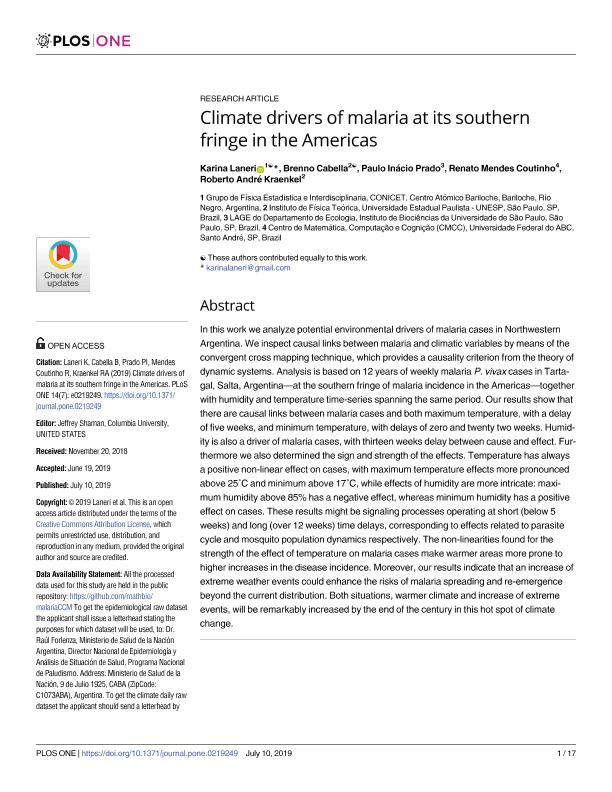Mostrar el registro sencillo del ítem
dc.contributor.author
Laneri, Karina Fabiana

dc.contributor.author
Cabella, Brenno
dc.contributor.author
Prado, Paulo Inácio
dc.contributor.author
Coutinho, Renato Mendes
dc.contributor.author
Kraenkel, Roberto André
dc.date.available
2021-01-27T03:11:55Z
dc.date.issued
2019-07
dc.identifier.citation
Laneri, Karina Fabiana; Cabella, Brenno; Prado, Paulo Inácio; Coutinho, Renato Mendes; Kraenkel, Roberto André; Climate drivers of malaria at its southern fringe in the Americas; Public Library of Science; Plos One; 14; 7; 7-2019; 1-17
dc.identifier.issn
1932-6203
dc.identifier.uri
http://hdl.handle.net/11336/123833
dc.description.abstract
In this work we analyze potential environmental drivers of malaria cases in Northwestern Argentina. We inspect causal links between malaria and climatic variables by means of the convergent cross mapping technique, which provides a causality criterion from the theory of dynamic systems. Analysis is based on 12 years of weekly malaria P. vivax cases in Tartagal, Salta, Argentina—at the southern fringe of malaria incidence in the Americas—together with humidity and temperature time-series spanning the same period. Our results show that there are causal links between malaria cases and both maximum temperature, with a delay of five weeks, and minimum temperature, with delays of zero and twenty two weeks. Humidity is also a driver of malaria cases, with thirteen weeks delay between cause and effect. Furthermore we also determined the sign and strength of the effects. Temperature has always a positive non-linear effect on cases, with maximum temperature effects more pronounced above 25C and minimum above 17C, while effects of humidity are more intricate: maximum humidity above 85% has a negative effect, whereas minimum humidity has a positive effect on cases. These results might be signaling processes operating at short (below 5 weeks) and long (over 12 weeks) time delays, corresponding to effects related to parasite cycle and mosquito population dynamics respectively. The non-linearities found for the strength of the effect of temperature on malaria cases make warmer areas more prone to higher increases in the disease incidence. Moreover, our results indicate that an increase of extreme weather events could enhance the risks of malaria spreading and re-emergence beyond the current distribution. Both situations, warmer climate and increase of extreme events, will be remarkably increased by the end of the century in this hot spot of climate change.
dc.format
application/pdf
dc.language.iso
eng
dc.publisher
Public Library of Science

dc.rights
info:eu-repo/semantics/openAccess
dc.rights.uri
https://creativecommons.org/licenses/by/2.5/ar/
dc.subject
malaria
dc.subject
climate
dc.subject
Argentina
dc.subject.classification
Ecología

dc.subject.classification
Ciencias Biológicas

dc.subject.classification
CIENCIAS NATURALES Y EXACTAS

dc.title
Climate drivers of malaria at its southern fringe in the Americas
dc.type
info:eu-repo/semantics/article
dc.type
info:ar-repo/semantics/artículo
dc.type
info:eu-repo/semantics/publishedVersion
dc.date.updated
2020-12-16T18:20:04Z
dc.journal.volume
14
dc.journal.number
7
dc.journal.pagination
1-17
dc.journal.pais
Estados Unidos

dc.journal.ciudad
San Francisco
dc.description.fil
Fil: Laneri, Karina Fabiana. Comisión Nacional de Energía Atómica. Gerencia del Área de Investigaciones y Aplicaciones No Nucleares. Gerencia de Física (cab). División Física Estadística; Argentina. Consejo Nacional de Investigaciones Científicas y Técnicas. Centro Científico Tecnológico Conicet - Patagonia Norte; Argentina
dc.description.fil
Fil: Cabella, Brenno. Universidade Estadual Paulista Julio de Mesquita Filho. Faculdade de Engenharia; Brasil
dc.description.fil
Fil: Prado, Paulo Inácio. Universidade de Sao Paulo; Brasil
dc.description.fil
Fil: Coutinho, Renato Mendes. Universidad Federal Do Abc; Brasil
dc.description.fil
Fil: Kraenkel, Roberto André. Universidade Estadual Paulista Julio de Mesquita Filho. Faculdade de Engenharia; Brasil
dc.journal.title
Plos One

dc.relation.alternativeid
info:eu-repo/semantics/altIdentifier/doi/https://doi.org/10.1371/journal.pone.0219249
dc.relation.alternativeid
info:eu-repo/semantics/altIdentifier/url/https://journals.plos.org/plosone/article?id=10.1371/journal.pone.0219249
Archivos asociados
